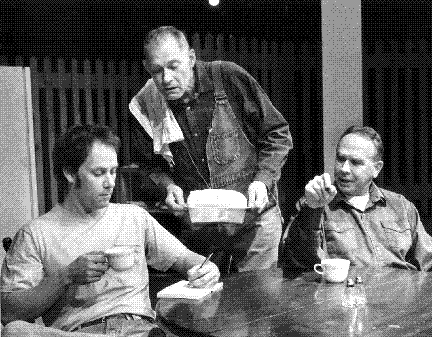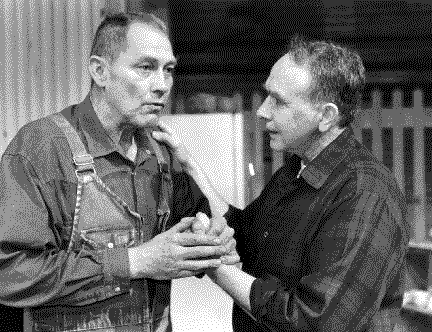Canadian Theatre Encyclopedia
The Drawer Boy

The Drawer Boy (1999) by Michael Healey revisits the origins of an alternative and experimental theatre in Canada - the collective creation of The Farm Show in 1972 by Theatre Passe Muraille.
In the 1970s a group of actors, including Miles Potter and David Fox accompanied Paul Thompson, the Artistic Director of Passe Muraille, on a theatre research trip to the rural heartland of southern Ontario. After interviewing local farmers and their families, they created a landmark Canadian theatrical event: The Farm Show. Almost two and a half decades later, Michael Healey went to work as an actor at the Blyth Festival and came into contact with many of the farmers and members of the local community whose stories had served as inspiration for The Farm Show. The impact of that experience, in turn, inspired the playwright to write his tribute to the power of art, The Drawer Boy.
It replays the adventures of a young actor from a Toronto theatre group who visits the rural Ontario home of two elderly bachelor farmers to "research" farm life for a new play. In doing so, he demonstrates the way in which a collective creation appropriated the lives of its subjects and changed their own interpretation of it. The two farmers, Morgan and Angus, have achieved a precarious balance in their lives together. Morgan, a tough-minded, stubborn man, cares for Angus, who has had brain damage and lost his memory during the bombing of London in the Second World War. Angus is initially identified as "the drawer boy" because he used to design buildings, and has the talents of an architect. Miles calms and reassures Angus by retelling their story - of the two tall women whom they loved, and who came to live with them in Canada. The young actor, Miles, learns, however, that this story is a fiction, and that the truth is much sadder. It would, in fact, destroy their friendship. In the process of telling their story as play, however, he reawakens Angus's memory. Art becomes life. Miles is in effect the "drawer boy," delineating and creating an alternative reality. As he tells Morgan, "We're here to get your history and give it back to you." The Drawer Boy is fundamentally about the power of storytelling in creating and interpreting reality, and how it can transform lives. There is much more in the play than a history of Canadian drama.

The Drawer Boy premiered in Toronto at Theatre Passe Muraille in 1999, directed by Miles Potter, and with David Fox as Angus, Jerry Franken as Morgan, and Tom Barnett as Miles. It was subsequently produced by Ed Mirvish Productions at the more opulent Winter Garden Theatre in Toronto and the Manitoba Theatre Centre, Winnipeg in 2001. The 2001/02 revival by the National Arts Centre in Ottawa toured to the major regional theatres: Hamilton's Theatre Aquarius, Edmonton's Citadel Theatre, and the Vancouver Playhouse. It has been produced across North America, in London and Dublin, and has been translated into German, French and Japanese. It has recently been made into a feature film, shot in Blyth, Ontario, with a cameo by Paul Thompson. In concert with the release of the film, The Drawer Boy was again performed at Passe Muraille in February, 2018 (dir. Nina Lee Aquino) in celebration of the theatre's fiftieth anniversary, with Anishinaabe actor Craig Lauzon as Angus and Andrew Moodie as Morgan.
It has won the Dora Mavor Moore Award for Outstanding New Play, a Chalmers Award, and a Governor Generalís Award.
As Joel Greenberg stated in his theatre review for Aisle Say, "Thirty years ago, when The Farm Show was first created - it is the inspiration for Healey's play - no one in the local theatre community would have guessed that such movement was possible. That was a time when the 'underground' and the 'mainstream' were separated by a gulf too wide to consider negotiable. Happily, time has provided a bridge that makes such distinctions increasingly irrelevant." Canadian novelist and poet Michael Ondaatje believed that "it is one of the few plays to create an authentic tradition in our culture," and former Globe and Mail critic Kate Taylor, concluded that it was "fast turning into a Canadian classic."
Photos courtesy of Theatre Passe Muraille.
Commentary by Anne Nothof, Athabasca University
Last updated 2022-01-17

